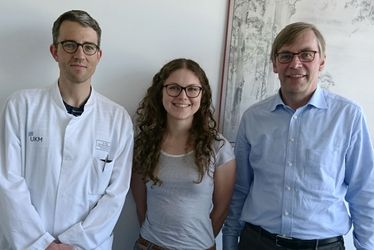News
Das aktuelle "Paper of the Month" (04/2018) geht an: Anke Hermann aus der Medizinischen Klinik D
Für den Monat April 2018 geht das "Paper of the Month" der Medizinischen Fakultät der WWU Münster an:
Anke Hermann aus der Medizinischen Klinik D für die Publikation:
WW and C2 domain-containing proteins regulate hepatic cell differentiation and tumorigenesis through the hippo signaling pathway
By: Hermann, Anke; Wennmann, Dirk Oliver; Gromnitza, Sascha; et al.
HEPATOLOGY Volume: 67 Article Number: 4 Published: APR 2018
Zu Hintergrund, Fragestellung und Bedeutung der Publikation:
Die Regulation der Zellproliferation und des Organwachstums unterliegt einem komplexen Netzwerk an Signalwegen. Besonders wichtig ist hier der Hippo-Signalweg, der im aktiven Zustand die Zellteilung hemmt und so ein überschießendes Organwachstum verhindert. Wir konnten nun kürzlich die WWC-Proteine als Aktivatoren des Hippo-Signalweges identifizieren. Die genaue Funktion der WWC-Proteine im Organismus war jedoch bislang unbekannt. Wir konnten zeigen, dass ein Verlust der WWC-Expression in der Leber von Mäusen zu einer deutlichen Organvergrößerung, einer begleitenden Entzündungsreaktion und schließlich zu einer Bildung von Karzinomen führt. Dabei blockiert das Fehlen der WWC-Proteine den Hippo-Signalweg gleich auf mehreren Ebenen und aktiviert so die über den Ko-Transkriptionsfaktoren YAP-gesteuerte Expression von proliferationsfördernden Genen in der Leber.Wir konnten erstmals die WWC-Proteine als wichtige Schaltermoleküle für die Hippo-Signalweg-abhängige Regulation der Zellproliferation und Karzinombildung in der Leber beschreiben. Unsere Daten können dazu dienen, die Expression der WWC Proteine als neuen prognostischer Faktor für Lebertumore einzusetzen.
Background and fundamental question of the publication:
The regulation of cell proliferation and organ growth underlies a complex network of signal transduction pathways. Among these, the Hippo signaling pathway is very important as, in its active state, inhibits cell proliferation and de-regulated organ growth. Recently, we could identify the WWC proteins as activators of Hippo signaling. However, the in vivo function of the WWC proteins was unknown, yet.We could show that a loss of WWC expression in the liver of mice leads to an increased organ growth, an adjacent inflammation reaction and finally to carcinoma formation. Loss of WWC expression prevents Hippo signaling at different stages and thus activate expression of proliferation genes mediated by the co- transcription factor YAP in the liver. Our data define the WWC proteins as key components in the Hippo pathway-dependent regulation of cell proliferation and carcinoma formation in the liver. Our data will help to use the expression of WWC proteins as a novel prognostic factor for liver tumors.
Anke Hermann aus der Medizinischen Klinik D für die Publikation:
WW and C2 domain-containing proteins regulate hepatic cell differentiation and tumorigenesis through the hippo signaling pathway
By: Hermann, Anke; Wennmann, Dirk Oliver; Gromnitza, Sascha; et al.
HEPATOLOGY Volume: 67 Article Number: 4 Published: APR 2018
Zu Hintergrund, Fragestellung und Bedeutung der Publikation:
Die Regulation der Zellproliferation und des Organwachstums unterliegt einem komplexen Netzwerk an Signalwegen. Besonders wichtig ist hier der Hippo-Signalweg, der im aktiven Zustand die Zellteilung hemmt und so ein überschießendes Organwachstum verhindert. Wir konnten nun kürzlich die WWC-Proteine als Aktivatoren des Hippo-Signalweges identifizieren. Die genaue Funktion der WWC-Proteine im Organismus war jedoch bislang unbekannt. Wir konnten zeigen, dass ein Verlust der WWC-Expression in der Leber von Mäusen zu einer deutlichen Organvergrößerung, einer begleitenden Entzündungsreaktion und schließlich zu einer Bildung von Karzinomen führt. Dabei blockiert das Fehlen der WWC-Proteine den Hippo-Signalweg gleich auf mehreren Ebenen und aktiviert so die über den Ko-Transkriptionsfaktoren YAP-gesteuerte Expression von proliferationsfördernden Genen in der Leber.Wir konnten erstmals die WWC-Proteine als wichtige Schaltermoleküle für die Hippo-Signalweg-abhängige Regulation der Zellproliferation und Karzinombildung in der Leber beschreiben. Unsere Daten können dazu dienen, die Expression der WWC Proteine als neuen prognostischer Faktor für Lebertumore einzusetzen.
Background and fundamental question of the publication:
The regulation of cell proliferation and organ growth underlies a complex network of signal transduction pathways. Among these, the Hippo signaling pathway is very important as, in its active state, inhibits cell proliferation and de-regulated organ growth. Recently, we could identify the WWC proteins as activators of Hippo signaling. However, the in vivo function of the WWC proteins was unknown, yet.We could show that a loss of WWC expression in the liver of mice leads to an increased organ growth, an adjacent inflammation reaction and finally to carcinoma formation. Loss of WWC expression prevents Hippo signaling at different stages and thus activate expression of proliferation genes mediated by the co- transcription factor YAP in the liver. Our data define the WWC proteins as key components in the Hippo pathway-dependent regulation of cell proliferation and carcinoma formation in the liver. Our data will help to use the expression of WWC proteins as a novel prognostic factor for liver tumors.




